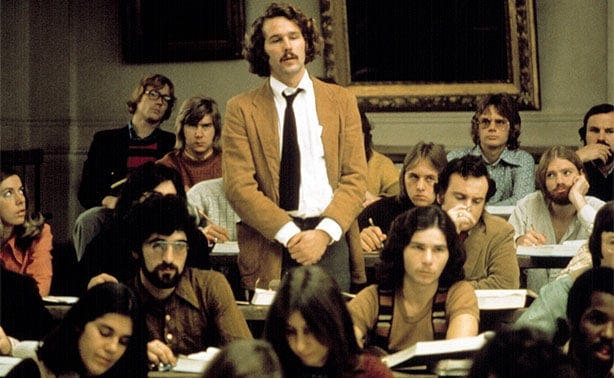The non-conservative conservative movement against higher education
What's in the Daily News?
This is not a story about Harvard or Yale. It is a story about public universities in Indiana, and a state legislature that has composed a bill, something of a dog’s breakfast, that as of this morning is awaiting a signature by the governor, on “State educational institution matters”.
Its focus is ostensibly about ensuring that public universities in the state - I teach at one of them - have free expression and “intellectual diversity.” Some of the provisions are relatively harmless: new students have to receive some information (at orientation?) that we value freedom of expression and intellectual diversity. We’ll be sure to squeeze that in after proclaiming how many student organizations we have.
But other aspects are more insidious, when it comes to what we teach, and how faculty are evaluated.
Let’s start with “intellectual diversity”, which instructors will be required to demonstrate in their classes, and on which they will be regularly reviewed. The bill’s language defines it as “multiple, divergent, and varied scholarly perspectives on an extensive range of public policy issues.” This shows the hand of the bill’s authors: divergent and varied perspectives on organic chemistry, financial accounting, topology, or Beethoven’s middle-period string quartets are not required. Even many courses where there might be divergent and varied perspectives are likely in the clear. Back in the day I used to teach undergraduate intermediate microeconomic theory. I am going to guess that whoever teaches that now will not have to worry about incorporating Marxist, institutionalist, Austrian, or Post-Keynesian critiques in their syllabus, but can simply carry on as always regarding utility functions, indifference curves, and marginal rates of substitution. No, this is all about “public policy issues”. Which means … what, exactly? Do the anti-vaccination crowd get their place on the epidemiology syllabus? Does the instructor in a course on trade policy need to give due consideration to the mercantilists? But then, the vagueness of all this is by design: instructors, be on your guard, watch your back.
Or, watch your front. A provision in the bill ensures a mechanism by which students can snitch on the instructor who is insufficiently intellectually diverse, thus starting a formal review. In a bill with many, many, bad parts, I find this the worst.
Republicans have been known to criticize universities for expanding their budgets on administrative positions rather than the business of education, but this bill creates all manner of regular, and ad hoc, review processes. Including of tenured faculty, who will need to establish their intellectually diverse bona fides at regular intervals, and be subject to dismissal if not up to scratch. I don’t need to say much to any reader of this page the problems with this.
Now, as a matter of fact I do teach diverse perspectives, including ones that conservatives of yore would have cheered: across a few different courses Burke, Hume, Smith, Eliot, Arnold, Hayek, and Oakeshott all put in an appearance. I’ll be gone by the time this bill begins to take effect (“what are you, a hockey player?”) but if I’d planned to stay I might be up for some sort of medal from these folks.
Or not. For Burke and Oakeshott would find this whole business cringeworthy, as the kids say. It is not conservative in the least:
Seeking solutions where there is no clear evidence of a problem needing solved;
Inserting themselves into an institution about which they only have vague understanding and no earned practical knowledge, a complete lack of intellectual humility;
Tearing down institutional arrangements without taking a moment to pause and ask why the arrangements were made in the first place (cf. Chesterton’s fences);
Changing institutional arrangements not because of a gradual change in circumstances that has made institutional change worth consideration, but because the political currents of this month make it seem like an advantageous thing to do.
But I don’t think the bill’s authors could care less.



The economics of trade are difficult to grasp -- somehow counter-intuitive. Students in a trade class might benefit from a brief section on what the mercantilists of yore believed, what modern mercantilists believe and why, and the benefits and costs of implementing mercantilism. "Leftist" economist Christian Parenti praises tariffs in his book, Radical Hamilton: Economic Lessons, as does future Trump Treasury Secretary Robert Lighthizer in all his work. Could students consider this work and learn something from it? I fear that what I propose would run the risk of having the instructor fired in Indiana and many other states.
It seems to be an article of faith among 'conservatives' in the US that universities are filled with leftists who are brainwashing impressionable young minds. For example, it only took a few seconds of a web search to come up with the following example of this:
"An ex-Communist Romania-born academic recently left his tenured position at Columbia University because the Ivy League school is 'on its way toward full blown communism.'
"The latest study of American campuses shows that nearly 40% of the colleges surveyed did not have one professor on their faculty who identified as a Conservative. Yet, some still say Socialist indoctrination of classroom politics is a right-wing fabrication?"
The idea of enlisting students to denounce professors who are not including the 'right' ideas is reminiscent of the Cultural Revolution. What next? Struggle sessions and dunce caps?
Probably the safest course of action, particularly after the next election, would be for all professors to put The Art of the Deal on their reading lists.